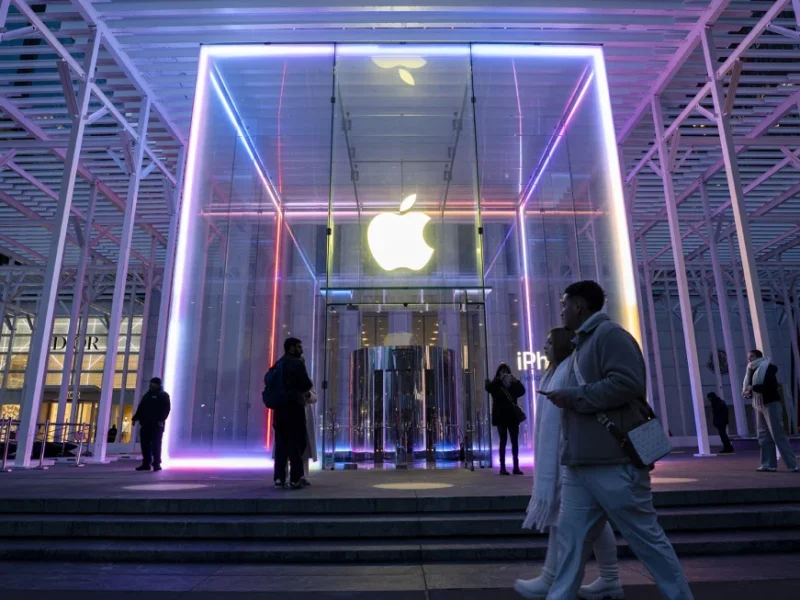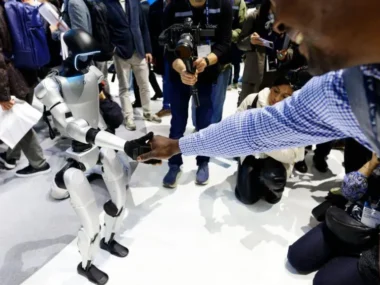When Apple introduced its upgraded Siri last June, it described the launch as the beginning of a new chapter for the 13-year-old virtual assistant. The demonstration showcased how Siri could analyze emails, messages, and live flight data to handle complex queries like, “When is my mom’s flight landing?” followed by “What’s our lunch plan?”
However, that vision is taking longer to materialize than expected.
On March 7, Apple announced a delay in a planned Siri update that was supposed to enhance personalization by integrating iPhone data and performing tasks within apps. This setback has raised concerns about Apple’s position in the AI race and caused internal frustration within the Siri division. According to Bloomberg, the executive overseeing the product called the delay “ugly” and “embarrassing.”
AI is widely seen as the next phase of digital evolution, potentially reshaping how people work, communicate, and access information. Apple revolutionized the mobile industry in 2007 with the iPhone, which became a cornerstone of modern computing. Now, the pressure is on for Apple to make a similar impact in AI—while competitors continue rolling out new models, processors, and AI-driven features at an accelerating pace.
But Apple’s challenges don’t stop there. Like many major tech firms, it faces the risk of increased tariffs on Chinese imports, a critical part of its iPhone supply chain. Meanwhile, its sales in China dropped 11% year-over-year, as CEO Tim Cook disclosed in January. Additionally, iPhone revenue—key to Apple’s $3 trillion market value—fell short of Wall Street’s expectations in its fiscal first quarter, despite overall revenue growing 4% year-over-year. As of Tuesday afternoon, Apple’s stock was down about 12% for the year.

Apple store employees assist customers as the iPhone 16 series launches in Beijing, China, on September 20, 2024.
However, the outlook isn’t entirely negative. Experts told CNN that Apple’s vast user base and the iPhone’s widespread presence provide a strong advantage in overcoming these challenges.
“If times are tough, Apple is in a solid position because its core business revolves around smartphones,” said Barton Crockett, managing director and senior research analyst at Rosenblatt Securities. “Smartphones have arguably become an essential consumer product—one of the most indispensable staples today.”
Apple has yet to respond to CNN’s request for comment.
Apple could be struggling to keep up in the AI race.

In this photo illustration taken on June 12, 2024, in Athens, Greece, the Apple Intelligence logo appears on a smartphone, with the Apple Siri logo visible in the background.
Concerns have persisted that Apple Intelligence—the company’s suite of AI features for iPhones, Macs, and iPads—has been lagging behind in artificial intelligence advancements. Unlike competitors such as Google and Samsung, which integrated AI tools into their devices earlier, Apple delayed the launch of its first Apple Intelligence features until October, missing the iPhone 16’s September debut.
By late 2024, Apple had introduced most of its promised AI capabilities, including custom emoji generation and ChatGPT integration with Siri. However, the fully revamped Siri is intended to drive a more significant shift in iPhone usage, allowing users to perform tasks—like retrieving an old texted recipe or editing a photo—without switching between multiple apps. Google and Samsung are pursuing similar AI-driven enhancements for Android devices.
Initially, Apple stated in June that these advanced Siri features would roll out over the next year, meaning before its upcoming developer conference in June. The update was previously scheduled for an April release, according to Bloomberg. However, company spokesperson Jacqueline Roy acknowledged the delay, stating, “It’s going to take us longer than we thought to deliver on these features,” with Apple now planning to introduce them gradually over the coming year. This statement appeared on the tech blog Daring Fireball on March 7.
Meanwhile, Apple’s competitors continue advancing their AI assistants. Google recently enhanced Gemini to tailor responses based on user search history, while Amazon introduced Alexa+, which can remember user preferences, such as favorite restaurants or music artists.
“Apple needs to stay relevant in this space,” said Ben Bajarin, CEO and principal analyst at Creative Strategies. “The lack of substantial progress is what concerns most people.”
A delay of this magnitude is unusual for Apple. The company has navigated challenges before, including competition from Chinese tech brands, fluctuating iPhone sales, and tariff issues during the previous U.S. administration. However, setbacks in product rollouts are rare.
“I can’t recall Apple making a similar move in the past,” said Gene Munster, managing partner at Deepwater Asset Management and longtime Apple analyst. “This doesn’t necessarily mean their culture has changed, but it does highlight how much they’re scrambling.”
Apple’s path forward beyond the iPhone.

Attendees examine the iPhone 16 models following Apple’s “It’s Glowtime” event in Cupertino, California, on September 9, 2024. On Monday, Apple introduced a new iPhone designed for generative AI, aiming to drive sales and demonstrate its competitiveness in the evolving tech landscape.
While the iPhone remains central to Apple’s business, Wall Street is constantly searching for the next big innovation—especially as smartphones have become routine purchases rather than exciting breakthroughs. Most consumers now upgrade their devices out of necessity rather than enthusiasm for new features. This means maintaining strong iPhone sales may not be enough in the long run. Apple will eventually need to lead the next major technological shift, which increasingly appears to be AI.
So far, Apple Intelligence hasn’t demonstrated that leadership. And with the new Siri update still delayed, uncertainty lingers over whether Apple can establish itself as a key player in AI.
Despite these setbacks, some analysts remain optimistic. Dan Ives of Wedbush Securities recently predicted Apple will reach new highs in 2025. CEO Tim Cook also noted that iPhone sales have been stronger in regions where Apple Intelligence is available.
There may also be strategic reasons for postponing Siri’s rollout. If the update isn’t performing as intended, delaying it could prevent technical issues. Google, for example, faced criticism when its AI Overviews tool generated flawed recommendations—such as advising users to put glue on pizza to keep the cheese from sliding off. Similarly, Meta removed AI-generated profiles earlier this year after backlash.
Meanwhile, Apple is reportedly developing a slimmer iPhone model, according to Bloomberg, The Information, and The Wall Street Journal. A redesigned device could help reignite interest in Apple’s flagship product, especially as Chinese competitors like Huawei explore innovative smartphone designs, including accordion-style foldables.
Ultimately, the Siri delay doesn’t signal a fundamental issue with Apple’s long-term strategy, said Barton Crockett.
“The path forward is clear—these features will emerge and improve,” he explained. “The iPhone’s future capabilities will surpass what’s available today… so there’s plenty to look forward to.”











